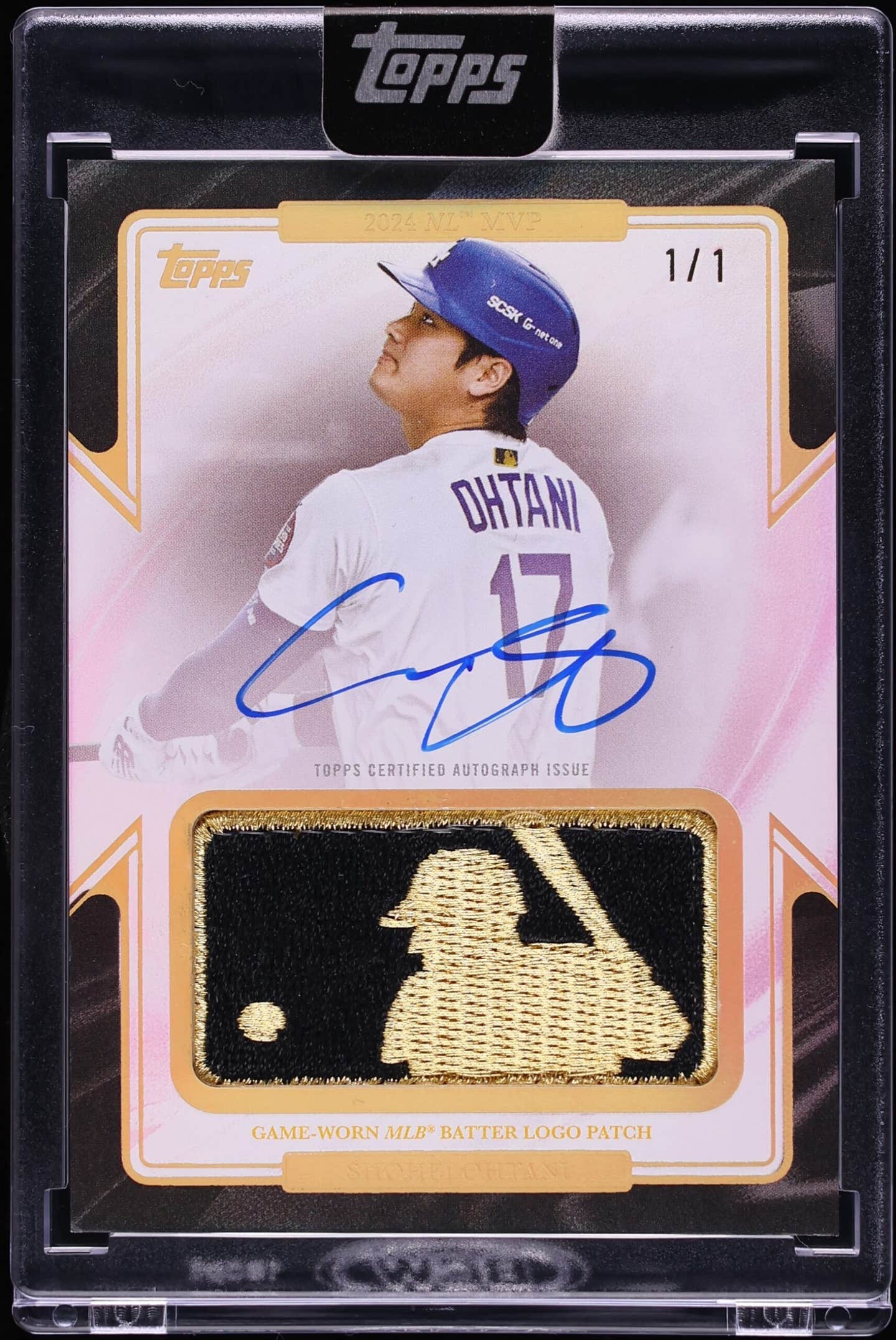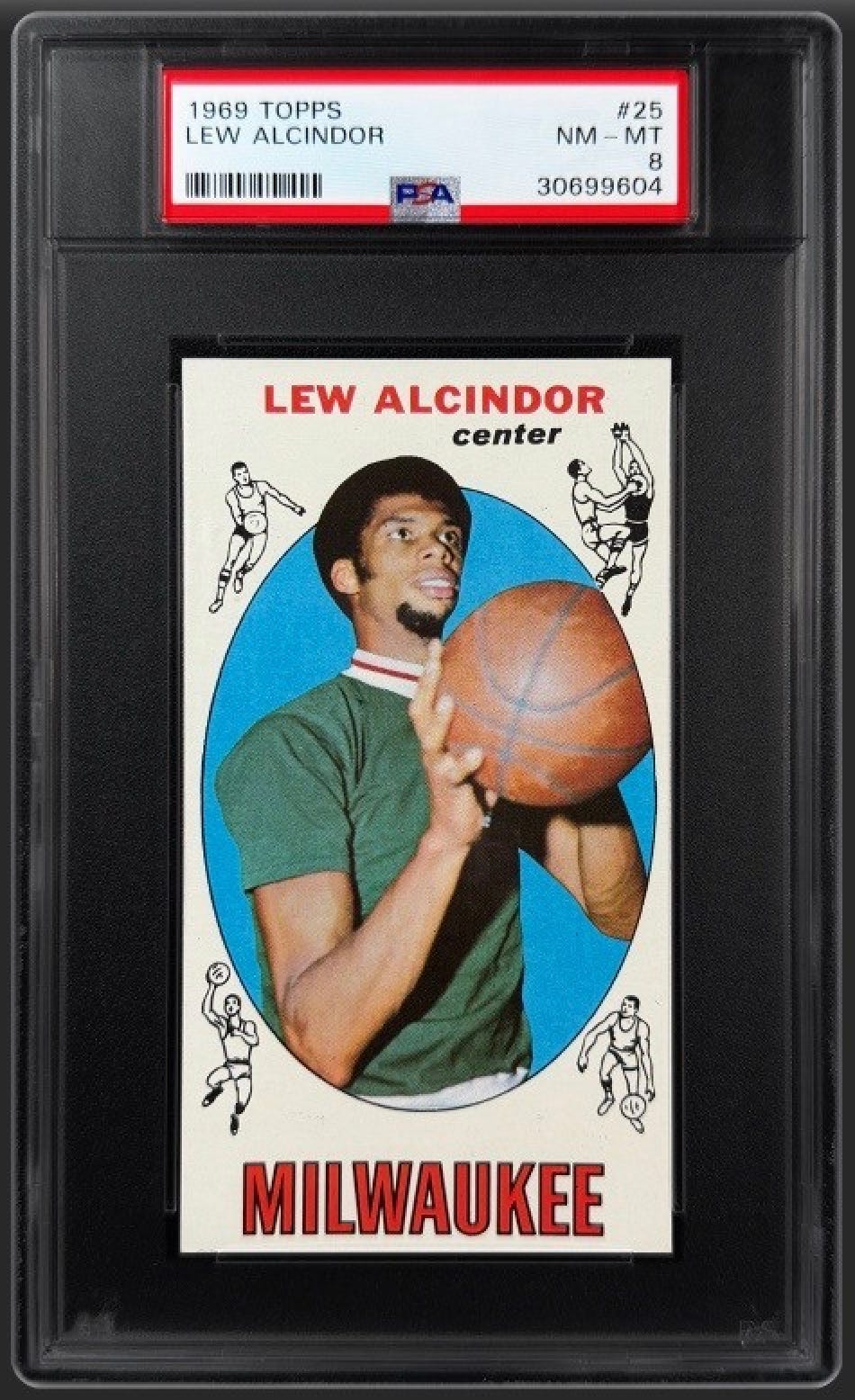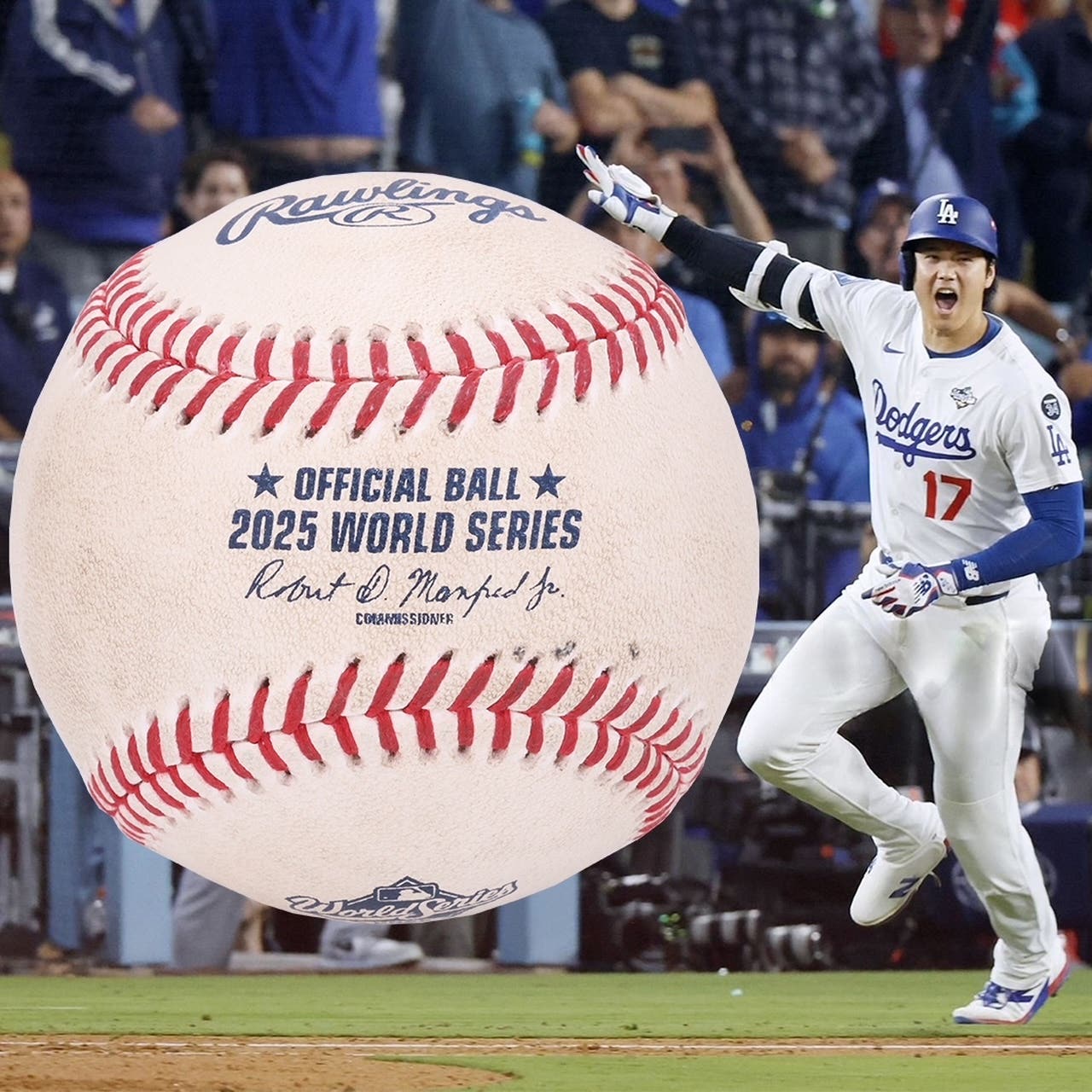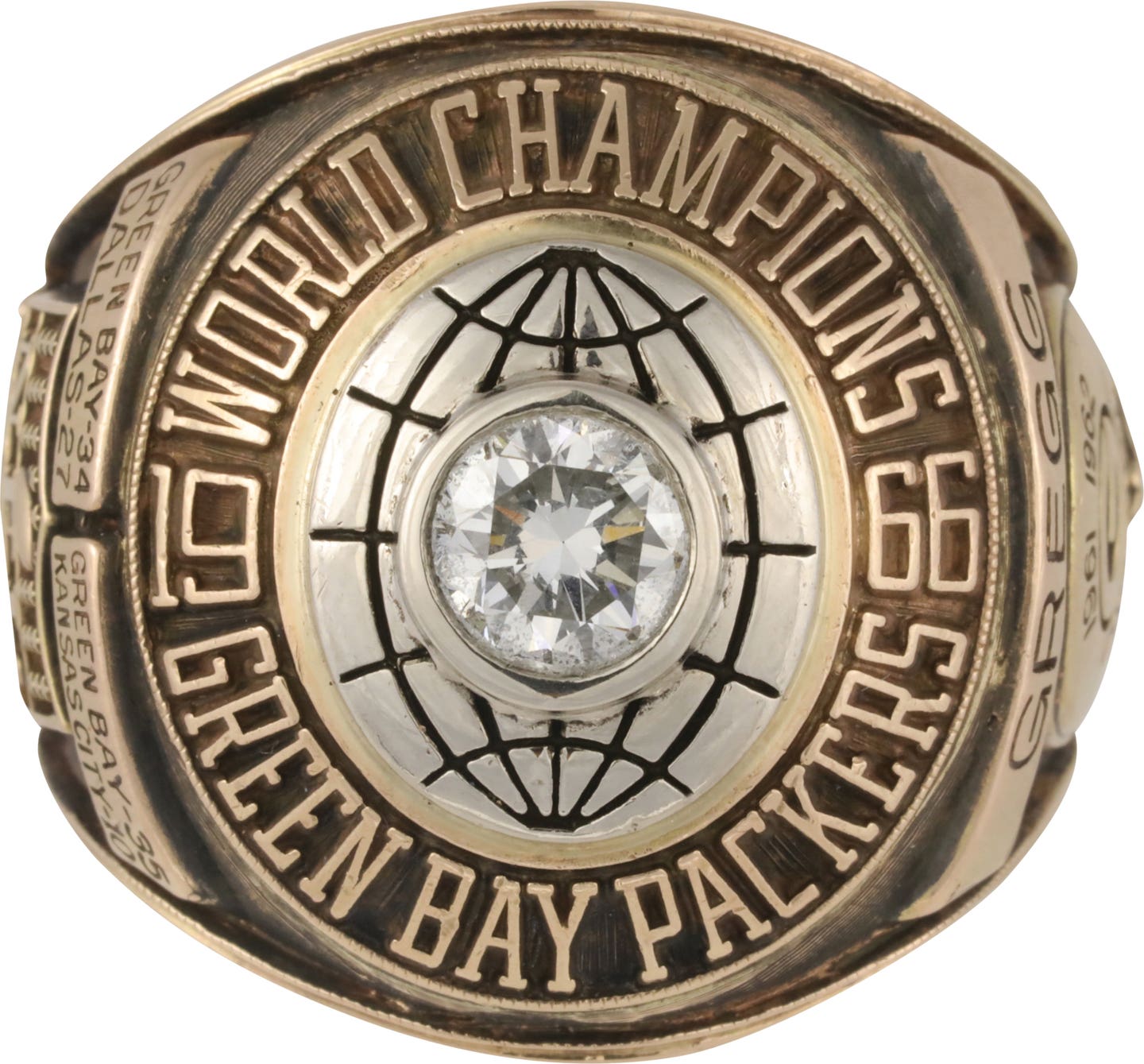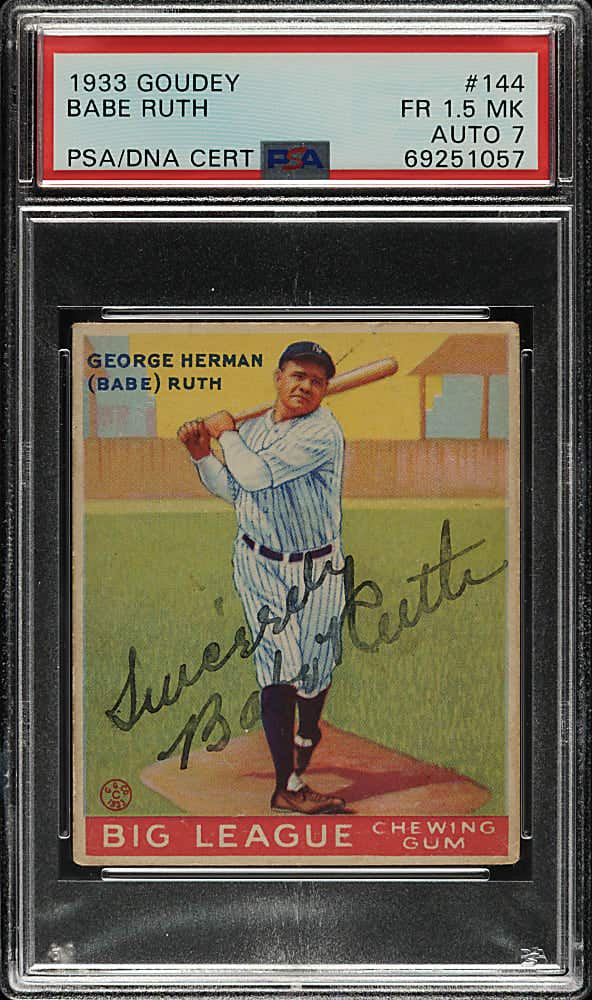Bert Padell reminds me of a number of New York characters that I have known over the years, and if that sounds derogatory, it shouldn’t, because the intent is to convey the enormity of presence, the loud, brash, unapologetic way that larger-than-life types survive and prosper in a city that is even bigger than that.
And though he’s a Yankees’ guy through and through, Padell also reminds me of a number of Brooklynites – one in particular – with his boisterous manner and distinctive speech patterns that let listeners know in the first five seconds where he came from.
Padell managed all of this in a lengthy phone interview arranged by another of my favorite New Yawkers, Marty Appel. Padell, one of the most prolific collectors on the East Coast, is known as the “financial adviser to the stars,” and he will be parting with a portion of his acclaimed collection in the October Geppi’s Memorabilia Road Show Auction in what is expected to be one of the largest and most significant offerings since, well, Halper.
Padell came by his collection the old-fashioned way, sending out mountains of autograph requests to sports and entertainment figures over the course of five decades, but he also found another effective source once he finished college with accounting and law degrees.
He was a batboy for the Yankees in 1949-50, Casey Stengel’s first two seasons, both world championship years, and later was a legitimate major league prospect before a collision at second base ended one dream and launched another. He formed lifelong friendships with players from the time, and went on to become the founding partner in the business management and accounting firm Padell, Nadell, Fine and Weinberger. His clients have included Robert DeNiro, Madonna, Britney Spears, Alicia Keys, Talking Heads, Mikhail Baryshnikov, Faye Dunaway, Pink Floyd, Run DMC, Madeline Kahn, Lorraine Bracco, Stanley Tucci, Cyndi Lauper, Earl Monroe, Blondie, Peter Max, Ben Vereen, and many more. Oh, yeah, he was also Joe DiMaggio’s business manager for 11 years. That carries some oomph in the sports collecting world.
An estimated 1,500 or so pieces from Padell’s remarkable collection are slated for the Oct. 24-26 Geppi’s Memorabilia Road Show Auction.
“Bert’s office has been a private, world-class museum, displaying some of the finest sports and entertainment collectibles ever assembled,” said Steve Geppi, president of Geppi’s Memorabilia Road Show. “We will be selectively auctioning these items over time, beginning with our October auction.” Geppi described The Padell Collection as the finest sports memorabilia collection to come to the market since Halper’s was sold at Sotheby’s in 1999.
“I started collecting at 7 years old. It wasn’t a big thing in those days,” said Padell, shown above in a 1949 Yankees team photo (front left) and more recently in the inset image. “And I used to write letters, I used to buy The Sporting News, and they would have articles about all of the old-time ballplayers. And they used to have an address with the articles. I used to send letters and self-addressed envelopes, and I would always get responses. This was long before I was the Yankees’ batboy.
“Ty Cobb once wrote me a note on the same stationery that I sent him. And he wrote, ‘Dear Bert; Sorry that I didn’t return all your old letters, but either you forgot to send a self-addressed envelope, or it got lost in the mail.’ It was in green ink, that was his favorite, and that letter is in this auction.”
He has a letter from Cobb that refers to the famous Charles Martin Conlon photograph with Cobb sliding into third base. It was sent to a client of Padell’s on Broadway, and Cobb had told him that he hadn’t had any choice but to go into third with spikes high, because Jimmy Austin had been blocking the base. “That’s a great letter,” Padell said.
And Padell has something else that he thinks should be in the Hall of Fame. “It’s better than the bat that was used for the first home run at Yankee Stadium that sold for more than $1 million,” he continued. “I have a letter from the president of the Boston Red Sox in January of 1918, his next-to-the-last last year as a Red Sox (and where Ruth pitched extensively) that said, ‘If you win 24 games, you get a $1,000 bonus (he had won 23 and 24 games in the previous two seasons), and if you win 30 games, you get a $1,500 bonus.’
“And it’s signed George Herman ‘Babe’ Ruth, and by the president of the Red Sox, Harry Frazee. A man in Westchester, N.Y., that I met through one of my clients in the entertainment business had this big box of items from the Red Sox in his attic, and it had been there for 30 years or more. And there was all this memorabilia, and he asked me if I wanted to buy it.”
Padell told him that he had never bought anything in his life. So he brought the stuff to Padell’s Midtown Manhattan office to have him look at it, and there are the letter and two contracts signed by Ruth, and he also had a lot of Red Sox contracts. “He offered them all to me for $5,000,” said Padell. “And I told him again that I had never bought anything, and he said he needed the money and he was in debt. So I said, OK. This was 25 years ago or so. And I paid him.”
And then Padell got a call from him the next day, and he said that a friend of his had called and offered him $25,000 for two of the Ruth items. “And I asked who his friend was, and he said, ‘Barry Halper.’ And I said, ‘You’ve got to be kidding.’
“And he let me photocopy the Ruth contracts and I got the letter and I got the Red Sox players contracts.”
Remembering the Great DiMaggio
When the Yankees where renovating the Stadium in 1973, they called Padell and told him they were throwing stuff away, and he wound up getting Gehrig’s locker from Pete Sheehy, who was extremely close to Gehrig. Another piece in the auction is a famous letter that Sheehy gave him from the New York parole commissioner signed in April of 1941 (Gehrig died in June of 1941) asking if Sheehy had any old bats, balls or gloves that he could give to the prisoners he would really appreciate it.
But ultimately it would be Padell’s relationship with DiMaggio that would become one of his greatest calling cards. Padell is never more animated than when he describes events involving The Yankee Clipper, and given his typically, uh, energetic patter, that’s really saying something.
“In October after we beat the Philadelphia Phillies in the World Series, I was going out to California with Jackie Jensen, Billy Martin, Fred Sanford, Cliff Mapes, Johnny Hopp and Cliff Mapes’ father-in-law,” Padell recounted.
“And I went to say good-bye to everybody, and I went up to Joe and said, ‘So long, Joe.’ And he said, ‘I heard that you were going to California with Jackie and the guys,’ and he was sitting near his locker with a towel around his midsection, and he went into his pocket and took out his billfold. And he took out seven $5 bills, and gave them to me, and said, ‘Is that enough?’
“I said, ‘Yeah, man, that’s enough,’ since he had never given me anything in this life. And I thanked him, and he asked if I needed anything else. So I said yes. ‘You’ve got two World Series bats in there, I would like to have one,’ I told him.
“He said, ‘OK, it’s yours.’ And years later, he was doing a commercial for Mr. Coffee with one of my clients, and I sent it over and asked Joe to sign it. And he signed it, ‘To my former teammate and pal, Bert Padell.’
“He really liked me a lot. I am not trying to be pompous, or anything like that. I was Joe’s business manager for 11 years in the late 1970s and 1980s.”
Padell gleefully recalled a trip during that period when he went with DiMaggio to Philadelphia to do a business deal. “And while we were on the train, a guy comes running over and says, ‘Mr. Coffee, Mr. Coffee, could you please sign this.’ And Joe looks at me and says, ‘This (expletive deleted) guy is crazy, calling me Mr. Coffee.’
“So I told Joe, go ahead and sign it Mr. Coffee. And he did. And they guy said, ‘Thanks so much.’ ”
Like so many clubhouse boys of that time, Padell wound up with considerable duties when it came time for the obligatory team-signed baseballs. “I always used to go around with balls for the ballplayers to sign, and I would have 10 dozen baseballs piled in front of me. I would stand in front of (DiMaggio’s) locker and he would look up and say, ‘What the (another expletive deleted) to you want?’
“And I would say, ‘What do you think? I’m not catching a streetcar here. Can you just sign the balls?’ And he would tell me to come over and we would sign them like an assembly line. Bingo, bingo, bingo, bingo. Can you imagine doing that every day? And then after a while, I used to sign better than he did.”
Given Padell’s relationship with DiMaggio, it was inevitable he would be sought as a source for some of the many articles and books about the legendary Yankee. “When they came to interview me for books about DiMaggio, I only said the right things. How could you knock somebody who did so much for baseball? You have to be loyal. In our lifetimes, there are so few values that people have, and I will tell you this much, I will always be loyal to Joe.”
When DiMaggio had his heel spur difficulties toward the end of his career, Padell would pitch batting practice to him and would play the infield and the outfield with him, just to help him get in shape.
“Joe would never talk to me about Marilyn,” said Padell, who got a menu signed by both icons at a time when they were vacationing in Florida. “You rarely see both their signatures together, except on their marriage license.”
Padell’s peripheral chores included unusual favors for a number of the Yankees’ greats from those two championship seasons. “I used to answer the mail for Joe Page and Phil Rizzuto, but nobody but the ballplayers themselves signed those balls.
“Joe Page was a great guy, and he used to say to that I should never open anything up when I got the mail, that I should smell all the envelopes,” Padell said with a laugh. And Page told him that if any of the letters smelled of perfume, he should put them aside immediately. “Then you start opening them up. If there any photos of girls, don’t read anything, don’t do anything, put them back in the envelope,” Padell said in recalling Page’s specific instructions. “Bingo, that goes to the side, and then you can start opening the rest,” he added.
“I used to sit on the bench with Casey, and every now and then I would give him a poke, because sometimes he would doze off a bit,” Padell recalled about the Hall of Fame manager, who was still relatively young at the time at only age 60 or so. “Sometimes it would be so hot, it was unbelievable. When you are in the dugout, it was a joke. We all need that once in a while,” said Padell, now in his 70s himself but still working full time at his business.
Padell’s status as a batboy would come with some of the traditional pressures that come from having that kind of unique access. “Whenever a friend of mine would ask for a bat, I would explain that the only way I could do it was if the bat was split,” said Padell. “And when a bat would break, I would give it to them, and they would ask me, ‘How much?’ And I told them nothing, because it didn’t cost me anything, so I wasn’t charging them anything. And that’s the truth.”
As mentioned earlier, that extraordinary access did produce some gems for his collection. “Here’s what I got when I was the batboy,” Padell continued. “I got a Joe DiMaggio bat, the World Series bat from 1950, Charlie Silvera gave me his glove, Johnny Mize gave me his glove and Hank Bauer gave me his glove, which I gave me to my friend, because he was an outfielder. And I got a couple of baseballs. That was it.”
In 1950, Mize gave Padell his 1949 All-Star Game bat from the game in Brooklyn. “I said to myself, ‘This would be great if I went into the visitors’ clubhouse and got everybody to sign it.’ So I got every team to sign it, and I have about 250 autographs on that one bat.
That should go into the Hall of Fame, too, with autographs from every player in the American League. And I don’t think you’ll ever see that again in your lifetime.
“And I just kept on collecting. I kept writing letters. I have a letter that was sent to Shoeless Joe Jackson from his lawyer, saying that Jackson was going to have to testify to the grand jury.”
He has a ticket from the 1932 World Series that was signed by Ruth. He has a George Sisler bat, Jackie Robinson’s high school yearbook that Padell got from the Hall of Famer’s high school coach. He has checks from the likes of Christy Mathewson, Walter Johnson and Orval Overall. “I even have Hal Chase’s autograph from the nurse who took care of him before he died.”
He has stuff that Madonna gave him, including one of her costumes, and he has a gown from Britney Spears and items from Luther Vandross, and says he has Campbell soup art signed by Andy Warhol and items from Mick Jagger. Even with all of that, it’s his Americana material that gets the always-animated Padell really into high gear.
“I have Civil War stuff that will blow your mind out,” he said, mentioning things like a letter from John Wilkes Booth and another with content about that emperor of France guy, Napoleon.
“I have a letter from General George Armstrong Custer, an 8-page letter to his uncle, saying that we should ‘kill every man, woman and child of the Confederacy,’ ” said Padell, who insists he was offered all of $250,000 for that particular letter. Yet he has never sold anything from his collection until this Geppi’s Memorabilia Road Show auction came along.
Not surprisingly, Padell notes that the auction houses have been after him for a number of years, for obvious reasons. “Christie’s wanted to do a deal with me, and the deal was all but done, but then I wanted some more money up front, and they didn’t want to give it to me.”
Enter Steve Geppi. “He’s a real gentleman; he has a major heart,” Padell said about the man who ultimately nailed the deal for the mammoth collection. “Not everything you do in life is just for money,” he added, noting that in addition to the items consigned to this auction, Geppi’s Memorabilia Road Show has the right of first refusal should he decide to consign any more material to auction over the next three years.
For the moment, he’s focusing on the potential from this initial foray. “If I were a rich guy, I would buy the whole blankety-blank collection,” Padell said with a laugh. I told him that after this auction, maybe he would be.
“From your mouth to God’s ear,” he said with finality.



